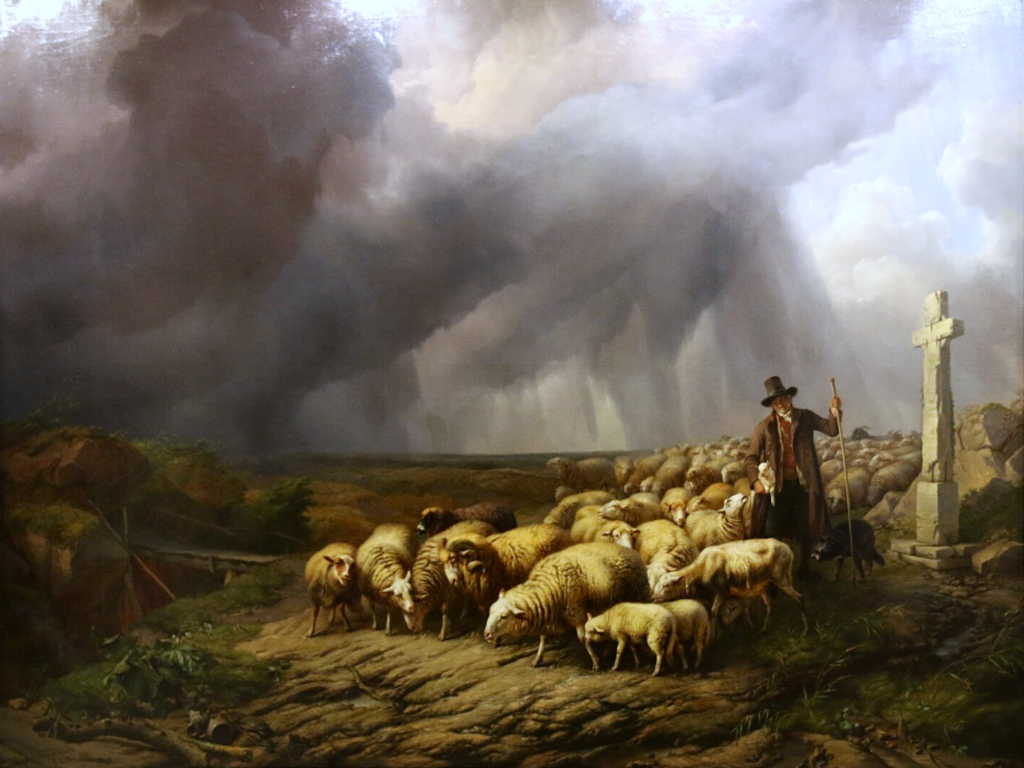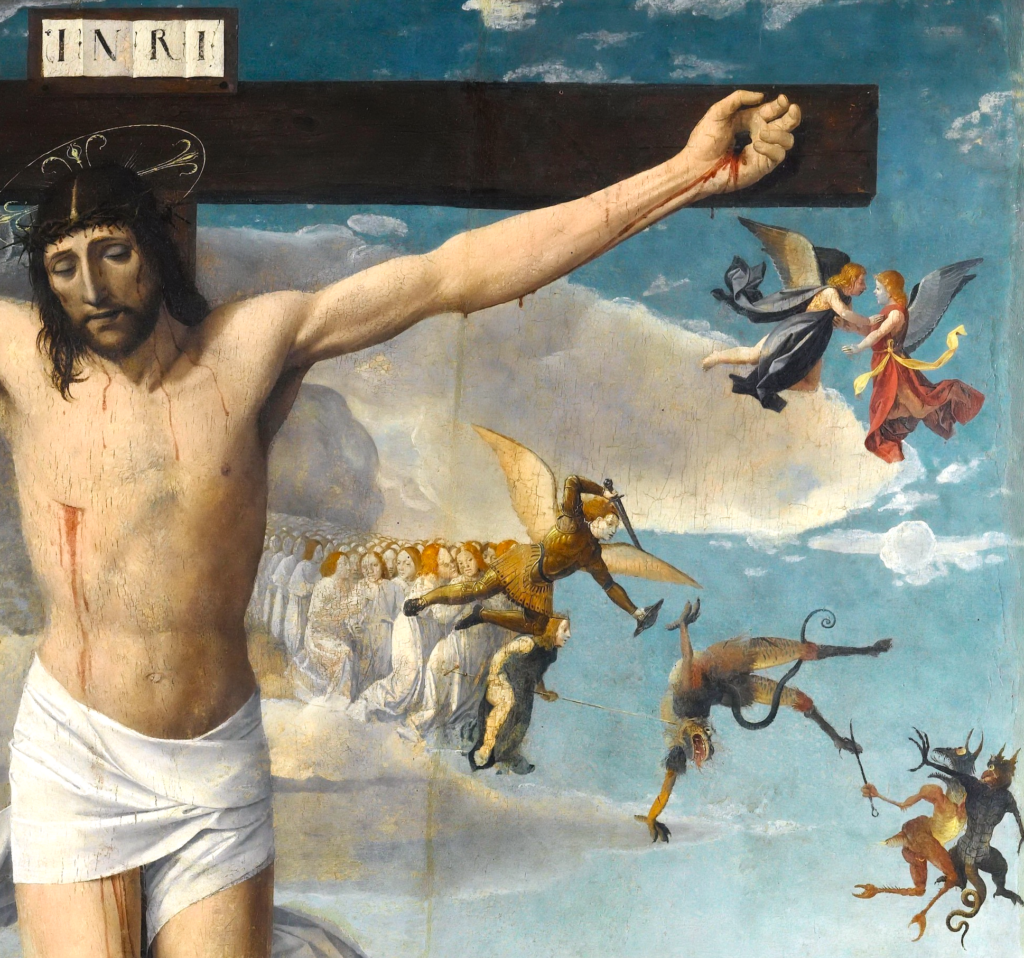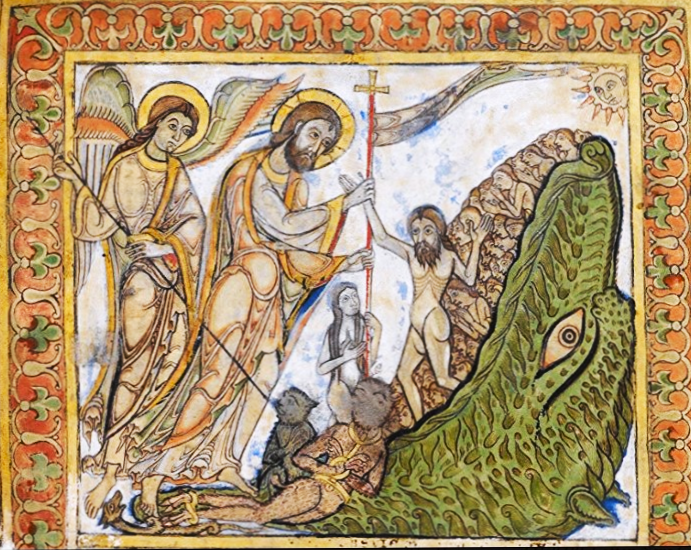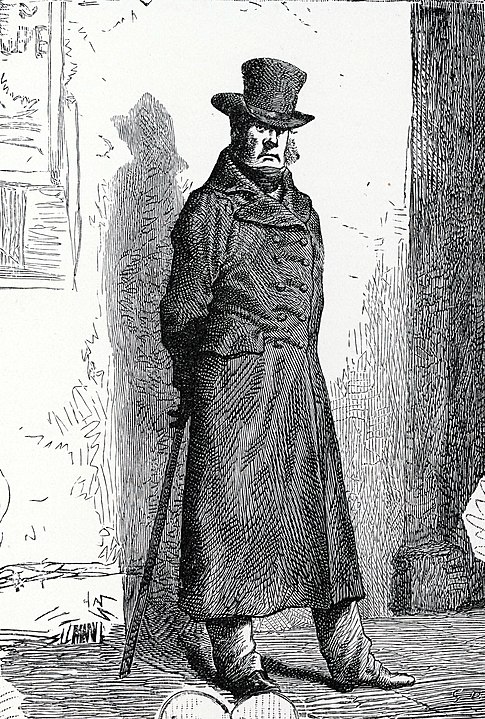Translation of the Epistle for the Third Sunday of Lent
Brethren: Be followers of God, as most dear children: and walk in love, as Christ also had loved us, and had delivered Himself for us, an oblation and a sacrifice to God for an odor of sweetness. But fornication, and all uncleanness or covetousness, let it not so much as be named among you, as becometh saints: nor obscenity, nor foolish talking, nor scurrility, which is to no purpose: but rather giving of thanks. For know ye this, and understand, that no fornicator, or unclean or covetous person, which is a serving of idols, hath any inheritance in the kingdom of Christ and of God. Let no man deceive you with vain words: for because of these things cometh the anger of God upon the children of unbelief. Be ye not therefore partakers with them. For you were heretofore darkness: but now light in the Lord. Walk then as children of the light: for the fruit of the light is in all goodness, and justice, and truth.
Continuation of the Gospel According to Luke
At that time Jesus was casting out a devil, and the same was dumb. And when He had cast out the devil, the dumb spoke, and the multitudes were in admiration at it. But some of them said: He casteth out devils by Beelzebub, the prince of devils. And others, tempting, asked of Him a sign from Heaven. But He, seeing their thoughts, said to them: Every kingdom divided against itself shall be brought to desolation, and house upon house shall fall. And if Satan also be divided against himself, how shall this kingdom stand? Because you say that through Beelzebub I cast out devils. Now if I cast out devils by Beelzebub, by whom do your children cast them out? Therefore, they shall be your judges. But if I by the finger of God cast out devils: doubtless the kingdom of God is come upon you. When a strong man armed keepeth his court, those things are in peace which he possesseth. But if a stronger than he come upon him and overcome him, he will take away all his armor wherein he trusted, and will distribute his spoils. He that is not with Me is against Me: and he that gathereth not with Me scattereth. When the unclean spirit is gone out of a man, he walketh through places without water, seeking rest: and not finding, he saith: I will return into my house whence I came out. And when he is come, he findeth it swept and garnished. Then he goeth and taketh with him seven other spirits more wicked than himself, and entering in they dwell there. And the last state of that man becomes worse than the first. And it came to pass, as He spoke these things, a certain woman from the crowd, lifting up her voice, said to Him: Blessed is the womb that bore Thee, and the paps that gave Thee suck. But He said: Yea, rather, blessed are they who hear the word of God, and keep it.
The Saving Words of the Gospel
In the Name of the Father, and of the Son, the Holy Spirit. Amen.
A kingdom divided against itself cannot stand.
Christ refers to the kingdom of darkness as a kingdom, and it’s certainly a parody of the kingdom of heaven.
When the one-third of the angels fell, they maintained their hierarchical structure and so, there is a very strict hierarchy amongst angels in heaven and a strict hierarchy amongst demons. No two angels are alike. No two have the same nature and so, therefore, no two of them are equal in authority. And what the kingdom of darkness has is more of a tyranny than a kingdom in the true sense of the word. It’s certainly not a community because the Kingdom of Heaven is a community. It’s a Body, it’s a Mystical Body of Christ, of all those who belong to Christ, and those who have been redeemed by His Blood. If you read the First… well in the letter of Colossians, the First Chapter, there’s a Christological hymn there, and you can see, if you read it attentively, that the angels who, the two-thirds of the angels, who passed the test and entered into the Beatific Vision, were redeemed by the Blood of Christ. And so, the Blood of Christ stretches out over time, into the past, into the future. And it’s outside of time, this overarching mystery of the death of God on a cross.
And so, he calls it a kingdom. It’s definitely not a community.
People misuse the word community a lot. You hear community used for all sorts of things you know people talk about a community of sodomites. Well, that’s impossible. Something that is built on a lie cannot be a community. There’s no truth there. There’s no unity. There’s no common purpose. I mean, we might as well have communities of arsonists, communities of liars, right? And if you ask a member of the community of liars, if he’s a member, he’ll say, “No,” so it doesn’t really help much.
As Our Lord is exercising this afflicted man, what happens? He notices what’s being said, and He interrupts the exorcism to address these protagonists, these Pharisees, and He tells them this parable, this mini parable, about the strong man who then is overtaken by the stronger man. And He had just done this two chapters before, in Chapter 12 of, well, a little before… this is in Chapter 12 of Matthew’s Gospel, (we just read from Luke). And a little before this episode that’s recounted in Matthew, He is in the midst of doing what He’s supposed to do and He interrupts in order to engage with His antagonist the Pharisees, and He gives them another mini parable. And that one is about the sheep fallen into a pit. Which of you would not save the sheep on the Sabbath fallen into the pit? And it’s interesting too because the word there is ρυομαι (ruomai) the same word for “deliver us from evil,” which is a beautiful word.
It’s a fascinating term, ρυομαι, because when Our Lord uses that in the Our Father, ρυομαι, it means “deliver us from the evil one”, not from evil as a concept, but from the evil one. “Deliver us from the evil one,” and this “deliver us” is said in what’s called the middle voice. In Greek, you have obviously different tenses, past tense, future tense, present, right? Voice has nothing to do with tense. Voice has to do with the quality of the action. For example, we’ve got active. You know what that is, right? ‘I untie the horse’, right? That’s I’m acting on the object. But if I were to say, ‘the horse was untied’, that’s passive. Alright? So, we have active in English, we have passive in English, but we don’t have middle. So, what is the middle voice in Greek? It’s a fascinating concept that they had of somebody acting with a certain self-interest. In other words, the one acting, what he does, is engaged, is involved, somehow in the result. If you know Spanish, you’ll hear this sometimes, Dios me lo bendiga, which the first time I heard it, it kind of struck me, I go, Dios me lo bendiga; “may God bless you for me.” You know, that would be the closest you can get in Spanish to the middle voice. In other words, I want God to bless you, but there’s something in it for me, because it’s a blessing for you to be blessed.
And so, this ρυομαι in Greek is in the middle voice, which means deliver us, but it’s not just ‘deliver us from the evil one and set us aside or set us on a path alone’, but ‘deliver us for yourself so that you can now possess us’. And so, ‘when you deliver us, we become yours, Lord.’ And that’s what we’re asking for in the last petition of the Our Father; “deliver us from the evil one” and, in a certain sense, we can say that that last petition of the Our Father is answered in this mini parable where Our Lord says, When a strong man armed, (that’s the demon) when a strong man armed keepeth his court those things which he posseth it are in peace.
So, this is really one of the Mysteries of Iniquity, that when we are in a state of sin, the devil will keep us, in a certain sense, in a state of false peace. As long as we don’t approach the means for salvation. When we approach the means of salvation, we go on a retreat, we go to Confession, then, there’s a certain interior torbation. I’m getting all worked up. There’s an anxiety. Why? Because there’s now a divergence of wills. And the devil wanted me comfortably numb before, living in a state of sin, distracted, living by slogans, not by principles, living according to my passions. When we live according to our passions, the devil doesn’t mess with us. Everything is fine with him as far as he’s concerned. But when we start turning to Christ, all of a sudden there’s an eruption. Bad things start happening. What is he trying to do? He’s saying, “Wait a minute. We had a relationship here. You can’t walk away from me like that.” But when we say “deliver us from the evil one,” we’re asking Our Lord to let us walk away from him and to walk with Our Lord.
When we are with Christ, if we’re in a state of grace, he is the stronger man who came and plundered the possessions of the strong man. Basically, his plunder. He had plundered us. He had taken us for himself in our sin and when Christ Comes to our aid, when He comes to ρυομαι, to “deliver us from the evil one,” He claims us for Himself and He strips the evil one of this possession, our souls. But if a stronger than he come upon him and overcome him, he will take away all his armor wherein he trusted and will distribute his spoils. Christ is manifesting His sovereignty.
It is important to understand that when we commit a sin, we don’t break a rule, we break Our Lord’s Heart. When we commit a mortal sin, we defect from the Mystical Body of Christ and submit ourselves to Satan, and not just Satan as the chief of demons, but to a very particular demon of the vice that we’ve committed. We basically enlist under the banner of that particular vice and now we are bound to that particular demon, and we belong to him. To commit a venial sin is infinitely worse than being possessed.
Hollywood doesn’t want you to know that. They want you to be intrigued by the circus sideshow of the extraordinary. We ought not fear the extraordinary things; obsessions, oppressions, possessions, infestations. They’re real, but they mean nothing compared to the life of sin or the life of grace. There’s no comparison. It’s not a question of degree, it’s a question of species. Because saints have been possessed. St. Miriam of Jesus Crucified was possessed. Other saints have been oppressed; Padre Pio. Others have been obsessed; Mother Teresa of Calcutta, demonically obsessed. Is this a moral problem? Of course not. It’s an affliction that Our Lord allows precisely for the servant of God to become holy through suffering. And so, our venial sin is infinitely worse than the extraordinary things any demon could ever do to us.
So, when Christ comes to deliver us, ρυομαι, He plunders us from the stronghold of the evil one, takes us to Himself, so that we can be His fully. And being His, walk with Him, follow Him. As Paul says in 1 Thessalonians, God has destined us to obtain salvation through Our Lord Jesus Christ, who died for us, that we might live with Him. Not just live, but we might live with Him, with Him as a defining element of our identity. Psalm 95 says, We are the people of His pasture and the sheep of His hand. Notice this sense of belonging. So, salvation for Paul consists in being transferred from the dominion of darkness into the Kingdom of the Father, into the Kingdom of the Beloved Son, by the power of Christ’s inexorable right hand, nailed immovably to the Cross.
And that’s why we see at the end of Matthew’s Gospel, right after the death of Christ, what happens? The curtain, the veil, and the Temple is split because the Old Testament has come to an end; the Old Covenant is done, it’s over. There’s no more Judaism, because there’s no more Temple, there’s no more sacrifice, there’s no more priesthood, there’s no more prophets. It’s over. And then Matthew has this very enigmatic statement where he says that the bodies of many saints rose.
So, notice this direct correlation of the death of Christ on the Cross and the rising of these saints to life. This was also the Harrowing of Hell when Our Lord went down into hell and collected, on Holy Saturday, He collected the souls of the just to bring them to Heaven and left the damn there to just wonder. In Isaiah, we see this mystery of the death of God and its fruits prophesied in Chapter 49, The captives of the mighty shall be taken, and the prey of the tyrant be rescued, for I will contend with those who contend with you, and I will save your children. And then he continues in Chapter 53, I will divide him a portion with a great, he shall divide the spoil with the strong; because he poured out his soul to death, and was numbered with the transgressors, yet he bore the sin of many, and made intercession for the transgressors.
And so, whereas Satan and his minions are parasites, incapable of building anything, incapable of making anything, all they can do is subjugate, manipulate, enslave, Christ pours out His Blood on the Cross to purchase us, to ρυομαιi, to “deliver us from the evil one”. And this is something that escapes the ossified, paralyzed mind of Satan. He can’t understand why God would go to the Cross to die for us. It escapes him. He doesn’t understand. It doesn’t make sense. And the entire economy of grace is something that blinds him.
Victor Hugo says in Les Misérables, this fascinating line, he says, teeth and claws fear the ungraspable. And so, when Satan can’t understand the working of grace in his soul, he just is frustrated and angry because it’s something that escapes him. He doesn’t understand humility. He doesn’t understand sacrifice. He doesn’t understand charity. He doesn’t understand anything that makes up the economy of grace and the work of God in our soul. All he can do is witness its effects.
My sheep hear my voice and I know them and they follow Me; and I give them eternal life. And they shall never perish; and no one shall snatch them out of My hand. My Father who has given them to Me is greater than all; and no one is able to snatch them out of the Father’s hand. I and the Father are One.
There’s a great spiritual writer from the 11th century, he was a contemporary of Bernard of Clairvaux. And his writings up until about the 19th century were thought to be those of Bernard of Clairvaux and then specialists just figured out that, well actually, these are from another monk who was a contemporary named William of St. Thierry. And William refers to Bernard as his best friend. You never see Bernard talk about William as his friend at all in his letters but nonetheless… William is a great writer, brilliant, very tender, deep, warm soul, and his writings are wonderful. I really recommend the writings of William of St. Thierry.
Anyway, he says this, and we’ll end with this, The time has come, O Lord, the time has come for You to have mercy. Make me Your captive in Your war with Satan. Strip for me everything superfluous, so that, in eternal charity, and indissoluble union, I may enter into the embrace of You my victor.
In the Name of the Father, and the Son, and the Holy Spirit. Amen




